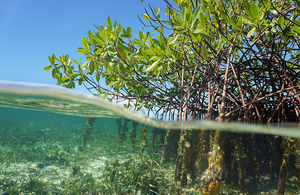HydroSurv wins ADMIRALTY Coastal Inundation Challenge
UKHO announce HydroSurv as the winner of its latest challenge to identify how marine geospatial data can be used to identify areas at risk of coastal inundation

An image showing mangroves, a tree found in tropical and sub-tropical regions that can act as a natural coastal defence for areas threatened by coastal inundation.
The UK Hydrographic Office (UKHO) have announced HydroSurv as the winner of the fourth ADMIRALTY Marine Innovation Programme challenge: assessing risk and resilience for coastal flooding.
For many people around the world, coastal inundation poses a significant threat. Caused by storm and tidal surges, coastal inundation can completely submerge coastal areas in sea water - causing substantial damage to infrastructure and harm to vulnerable communities. As part of the ADMIRALTY Marine Innovation Programme, the latest challenge called upon innovators and start-ups to develop solutions that could identify coastal areas that are most at risk of flooding and help communities build resilience.
Hydrosurv’s solution for the Coastal Inundation Challenge
As a global-innovator in uncrewed survey vessels and cloud applications for ocean industries, HydroSurv responded to the challenge with a prototype solution that used data collection and automated change detection software to identify areas at risk of coastal inundation. By analysing the differences between new bathymetry collected by uncrewed surface vessels and wider data sets, the solution will able to detect changes to coastal marine environments, such as erosion and movement of the seabed, that could increase the risk of coastal inundation.
As the challenge winner, HydroSurv will now collaborate with the UKHO, utilising marine geospatial data and expertise to develop an alpha product for wider release.
Commenting on the announcement, HydroSurv’s Founder and Chief Executive David Hull said:
UKHO is a world-leader in hydrography and marine geospatial data solutions for the ocean industries, and at HydroSurv we also recognise the need for updated solutions that respond to the future need for resilient shoreline management.
Climate change is driving the year-on-year increase to flood risk caused by rising sea-levels and extremes of weather, and by 2050, global damage costs could reach more than $1 trillion annually. The coastal practitioners and engineers involved in protecting coastal communities need to understand the rate of change in what is a dynamic environment. Access to frequent, reliable and repeatable data from a variety of sources is necessary to make actionable decisions.
We’re proud that the UKHO have selected our cloud-based application as the winner for the Coastal Inundation Challenge. Recognition from UKHO is the best example that our product has real potential to deliver impact. Timing to market this solution will be crucial, and the expertise base brought together through this collaboration will enable us to deliver an improved solution for users around the world at a rapid pace.
Melissa Yeong, Head of Market (APAC and Middle East) also commented on HydroSurv’s winning submission:
Many congratulations to HydroSurv on winning this challenge and creating a solution that will help to mitigate coastal inundation globally.
As one of the most common and costly disasters facing communities across the globe, coastal inundation poses an imminent threat to life and livelihoods, communities and economic development. Marine geospatial data can play a key role in helping disaster relief agencies and governments identify areas at risk and how factors such as weather conditions could further intensify the effects.
UKHO is empowering innovators and start-ups with the opportunity to work with our ADMIRALTY data. There are exciting times ahead for UKHO in supporting the development of powerful solutions that will have a positive impact on protecting and supporting our oceans, and we look forward to seeing more developments emerge in the coming years.